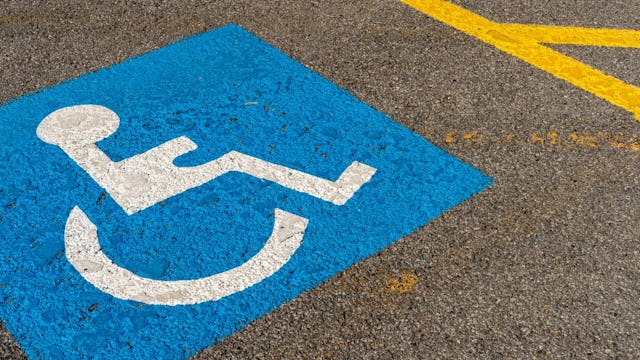To the People Who Park 'Just for a Minute' Blocking Accessible Parking

We went out to eat the other night. We parked, as we usually do, in the handicap spot. Nothing unusual there.
As we left the restaurant, we found a car parked right in the way of the loading zone of one of the handicap spots. Not only that, but this particular area also served as the pathway for where the sidewalk turns into a ramp.
Because the car was right in the way, I gently bumped my daughter’s wheelchair down the curb. Some curbs are large enough where I actually have to guide her backwards; this one was shallow enough where she could go forward.
As we went around the car, I saw there were people in both, the driver’s and front passenger’s seats. I tried to find the words for the frustration and anger I was feeling, but my wife found her’s first.
But what if, up until that point, they’ve been dismissive of handicap spots? Accessible bathroom stalls? Ramps and handrails? What if tragedy strikes? An accident, a birth defect, even something like a heart attack or stroke? What if they, or a loved one, suddenly finds themselves with a disability? Can they so suddenly demand that they and their newfound needs be respected when all their lives, they themselves did not respect others and others’ needs?
I beg you, dear reader, do not let it come to that. Do not wait until accessibility needs affect you personally. Show respect and love to others who require more than you do, and lead your children (or nephews and nieces, grandchildren, or even strangers) by example.
And finally, we will not shut up. We will continue to advocate for our daughter, just as we encourage her to advocate for herself. We believe accessibility should serve everyone as equitably as possible, and I hope you believe it, too.
“You can’t park here. You’re right in the way of the ramp, making it very difficult for people in a wheelchair.”
Like, say, this little girl who is in a wheelchair.
“I was just here for a minute. The drive through messed up my food.”
My wife replied, “It doesn’t matter. You’re in the way for people who need to use that ramp.”
“Whatever, shut up!” And with that, they drove off.
Obviously, the lady who insisted that we “shut up” and not advocate for our daughter’s accessibility needs, does not read The Mighty. Nevertheless, I am at least going to address her mindset, if not her.
Accessible parking spots, ramps, and marked off loading zones are not there for quick stops. They’re not there as reserved areas for everyone’s convenience. They’re there for people who need them. The time may come when you, too, will have need of them, and then you’ll find yourself on the other side.
My daughter was born with a disability. Most children, by contrast, are not. But with age, bodies will deteriorate; it’s simply the way of things. Having lived so long, they, like so many before them, will likely need assistive devices — even if just a cane. And now they will be on the other side.
Previously published on The Mighty.